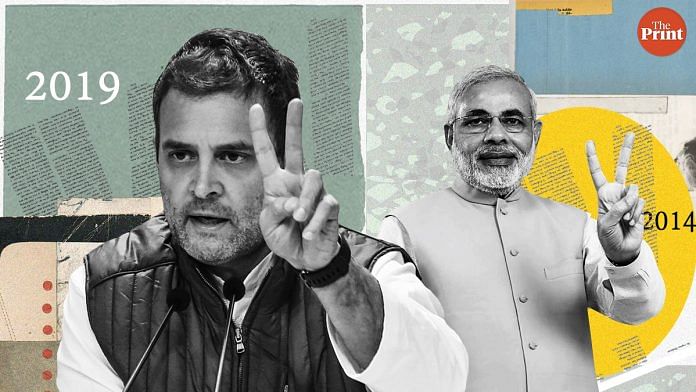Congress president Rahul Gandhi’s decision to contest 2019 Lok Sabha elections from Wayanad in Kerala and Amethi in Uttar Pradesh has ignited a debate on politicians wasting public money. Rahul Gandhi isn’t the first one though. From Atal Bihari Vajpayee to Narendra Modi, Mulayam Singh Yadav to Lalu Prasad Yadav — many politicians have contested from multiple seats in the past.
ThePrint asks: Contesting from 2 constituencies simultaneously: Waste of resources or democratic freedom?
In 2014, Modi could contest from Varanasi & Vadodara because he was confident of his appeal
 Nalin Kohli
Nalin Kohli
National spokesperson, BJP
There is no bar in any statute for a person to contest in more than one constituency. If that is to change, then Parliament in its collective wisdom will need to amend the existing statute to add such a provision.
The debate on the waste of resources will be part of a larger political discourse that will take place whenever there is a move to make these changes in Parliament.
Contesting in more than one seat needs to be seen from the perspective of political standing, political risk and political messaging.
When Rahul Gandhi chooses to move out of his family pocket borough of Amethi to pick a seat in the south – Wayanad – then obviously a larger debate is bound to ensue.
Why did he feel the need to play safe? Is there a lack of confidence because of Smriti Irani’s consistent work in Amethi? How does this move figure in the Congress party’s ‘working relationship’ with the Left parties, against whom Rahul Gandhi will be contesting now? Why didn’t he choose a seat in a state where the Congress is the government – Rajasthan, Madhya Pradesh or Chhattisgarh? Or even Karnataka?
Additionally, the comparison with PM Modi contesting from two seats in 2014, is incorrect. That PM Modi would easily have won in Gujarat, was established and obvious. The fact that he chose to contest from Uttar Pradesh was a clear message that he was appealing to a wider electorate, beyond Gujarat.
Rahul Gandhi needs to give a credible answer to the question of where does Wayanad fit in his party’s political messaging.
Rahul Gandhi’s decision to contest from both Amethi & Wayanad sends a clear message of a united India
 Priyanka Chaturvedi
Priyanka Chaturvedi
National spokesperson, Congress
India’s Constitution allows candidates to contest election from two seats. At one point, it even allowed them to contest from more than two seats. Former prime minister Atal Bihari Vajpayee had contested from three seats in 1957 general elections — Lucknow, Balrampur and Mathura in Uttar Pradesh — and had lost in two constituencies.
In a democracy, a candidate should be allowed to present his/her perspective to the constituencies from which he/she wishes to contest. I am certain that the candidate fielded by the party during byelection to one of the two seats deserted by the winning candidate is trusted by everyone, and lives up to the faith entrusted by the voters of that constituency in the party the bypoll candidate represents.
Congress president Rahul Gandhi’s decision to contest from Amethi (UP) and Wayanad (Kerala) sends a very clear message. We have never had a situation before where the differences between the north and the south have led to such divisions between the people of the two regions and all of this has been happening since 2014. We have seen how Prime Minister Narendra Modi has been shown black flags in Tamil Nadu, and booed in Karnataka and Kerala. We are witnessing the country being divided on the basis of religion, caste identity, geographical distance and the languages spoken.
Rahul Gandhi’s message is clear: we are a united nation and we must respect the diversity of this land.
Also read: NDA’s answer to Rahul Gandhi in Wayanad is a powerful OBC leader & liquor baron
EC has recommended limiting each candidate to one constituency, but Parliament isn’t agreeing
 S.K. Mendiratta
S.K. Mendiratta
Former legal advisor to Election Commission
Contesting from two Lok Sabha constituencies naturally leads to a significant waste of resources. If the politician wins in both the constituencies, then he/she will inevitably have to let go of one. This will mean a fresh round of elections – bypolls – in that constituency. Time, money and energy all go to waste in this process.
This is precisely why the Election Commission has recommended a limit of one constituency per candidate be imposed. But Parliament will have to make amendments to the existing laws for this to happen, something they are not agreeing to do.
At one point, there used to be no limit whatsoever on the number of constituencies a candidate can contest from. I remember a candidate contested from 43 constituencies in one election, long back. Fortunately, it was brought down to two per candidate. But I continue to hold that even that is inappropriate, one candidate should be allowed to contest from one constituency only.
Arguments of democratic freedom are all well and good, but that doesn’t negate the fact that this activity leads to a waste of resources.
Waste of resource argument is elitist, shows anti-democracy mindset
 Rasheed Kidwai
Rasheed Kidwai
Political analyst
The entire premise of waste of resources due to candidates contesting from more than one constituency is highly flawed, elitist and reeks of anti-democracy mindset.
The provisions in the Representation of the People Act, 1951 clearly provide for wider choice to the polity as well as the candidate, and are in line with the democratic setup of India and several other countries. Frequent polls, by-elections, shaky coalitions, element of instability in government(s) are all part and parcel of a vibrant democracy. These features should not be weighed in materialistic/monetary senses. If society, voters and political class is indeed concerned about wasteful expenditure, they should seriously consider propagating public funding of polls and cutting down use of black money in elections. On a more sombre note, toxic campaign, blatant use of religion and hate as an instrument to fetch votes is causing irreparable damage to democracy than few additional by-polls.
In a healthy democracy, candidates should have the right to contest from multiple constituencies. Voters are aware that the candidate is contesting in the other seat(s) too and they have an option of rejecting him. The spirit of this provision is to show that a leader has the support of the people across the country. Just as not voting is a democratic right, the right to contest from various constituencies should continue unhindered.
By Fatima Khan, journalist at ThePrint.







Rashid Kidwai is reading ‘passge’ as if giving Gyan to readers out here
Simple reply Mr. Kidwai. Simple
Is it not waste of resources. Like Security Forces’ Movent, Closure of Institution on polling day, deployment of Govt Official (teachers in particular). When election is organised in by-poll after a winning candidate resigns
These political beggars contest in two places for there security at the cost my money paid as tax… It need to be banned.
That apart, your reporting is heavily biased. No views of the other side.
When Indian law permits it. Then why this question and what is the problem. Only hate for one family and one person ?
I too can say Mr. Rajesh that it is Chatukarirta for ‘one family’. Article here is general discussion not about Pappu in particular.
Poetic justice would lie in any politician contesting from two seats, losing in both of them. If you don’t have the confidence to win one, chose a Rajya Sabha entry.
Yes there is no bar on candidates contesting from two seats. No wonder BJP government filed a affidavit in SC against PIL filed by BJP leader Ashok Kumar Updhyaya recently in December 2018. If BJP looks back the history they will know.
To be perfectly honest, a lack of self confidence.